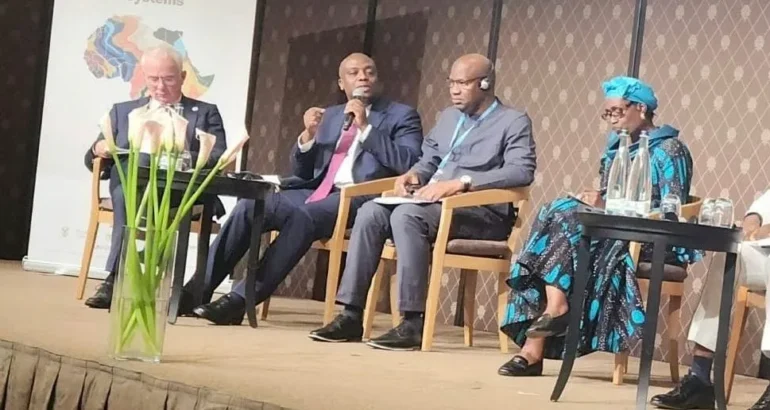Ghana is intensifying efforts to mobilize domestic resources and adopt innovative health financing strategies to protect its health system from the uncertainties of declining international aid, Deputy Finance Minister Thomas Nyarko Ampem revealed at the 78th World Health Assembly in Geneva.
Speaking at a side event titled “Navigating a New Era of Global and Domestic Health Financing,” Mr. Ampem highlighted the government’s commitment to reallocating resources, strengthening partnerships with the private sector, and implementing fiscal reforms to sustain health services in an era of shrinking donor support.
“External aid can no longer be relied upon,” Mr. Ampem asserted. “We must prioritize prevention, reallocate budgets, and unlock new investments through sound governance and innovation.”
Ghana’s strategy comes amid continent-wide concerns over diminishing donor contributions and widening health financing gaps. According to the World Bank, Africa’s health expenditure per capita averages just US$47, starkly contrasted with over US$4,000 in high-income countries.
Mr. Ampem stressed the importance of shifting policy focus toward primary healthcare and preventive services. Since January 2025, the government has expanded access to essentials like clean water, sanitation, nutritious food, and immunizations — interventions proven to be more cost-effective than disease treatment.
To maximize health funding, Ghana has committed to fully allocate the National Health Insurance Levy (NHIL) for its intended purposes. This year’s budget boosts funding for the National Health Insurance Scheme (NHIS) to GH¢9.8 billion, up from GH¢5.9 billion in 2024—a 66% increase. Over the medium term, Ghana plans to allocate GH¢49.3 billion to NHIS, a significant rise from the GH¢13.2 billion set aside between 2021 and 2024.
However, this fiscal commitment faces challenges amid shifting geopolitical and economic realities. Ghana is contending with the sudden withdrawal of US$78 million in USAID health aid, which supported malaria, HIV/AIDS, and child health programs. To cushion the impact, Ghana partnered with drone logistics company Zipline to deliver medical supplies efficiently without raising public expenditure.
“Adaptability is key,” Mr. Ampem noted. “We harnessed technology and logistics to bridge critical supply gaps and ensure uninterrupted care.”
Looking ahead, Ghana aims to boost domestic tax revenues—which average just 13% of GDP in sub-Saharan Africa—through digitized tax administration, reducing leakages, and broadening the tax base. The government is also fostering private sector involvement via public-private partnership (PPP) frameworks.
A new initiative, the Ghana Medical Trust Fund (MAHAMACARES), has been launched to finance treatment for non-communicable diseases not covered by NHIS and to attract private and philanthropic investments for health infrastructure and research.
Still, Mr. Ampem cautioned that success in attracting private investment hinges on improvements in governance and macroeconomic stability. The 2024 Mo Ibrahim Index shows that nearly half of Africa’s population resides in countries where governance has deteriorated over the past decade.
“Without fiscal discipline, building systems that draw long-term investments is impossible,” he said.
With Africa’s growing population and rising strategic importance, Mr. Ampem emphasized that now is the critical moment for the continent to transform its vision of health self-reliance into tangible results.
“We must act with urgency, unity, and foresight,” he concluded. “This is our chance to build resilient health systems for the future.”


